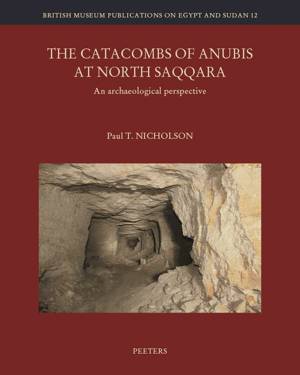
Bedankt voor het vertrouwen het afgelopen jaar! Om jou te bedanken bieden we GRATIS verzending (in België) aan op alles gedurende de hele maand januari.
- Afhalen na 1 uur in een winkel met voorraad
- In januari gratis thuislevering in België
- Ruim aanbod met 7 miljoen producten
Bedankt voor het vertrouwen het afgelopen jaar! Om jou te bedanken bieden we GRATIS verzending (in België) aan op alles gedurende de hele maand januari.
- Afhalen na 1 uur in een winkel met voorraad
- In januari gratis thuislevering in België
- Ruim aanbod met 7 miljoen producten
Zoeken
€ 234,45
+ 468 punten
Omschrijving
In 1897 Jacques de Morgan published a map of the Memphite necropolis, showing for the first time a pair of catacombs for mummified dogs. No further information was given and the catacombs remained largely un-investigated until the 21st century. In 2009 the Catacombs of Anubis Project was set up by Cardiff University who worked in collaboration with the Egyptian Supreme Council for Antiquities in an attempt to understand the larger of the two catacombs. This publication describes the work of the Catacombs of Anubis Project. It examines the way in which the catacomb was created and the likely phases of its development in the Late and Ptolemaic periods. The way in which the many thousands of animal mummies were procured is discussed in the light of modern faunal analysis and these results are combined with a new survey of the site to give a picture of the functioning of the cult at Saqqara. Finally, the way in which the monument may have been re-used in the post-pharaonic era is discussed. The results will be of interest to all those interested in animal mummies and in the development of catacombs as well as those concerned with the evolution of the sacred landscape of Saqqara.
Specificaties
Betrokkenen
- Auteur(s):
- Uitgeverij:
Inhoud
- Aantal bladzijden:
- 309
- Taal:
- Engels
- Reeks:
- Reeksnummer:
- nr. 12
Eigenschappen
- Productcode (EAN):
- 9789042945500
- Verschijningsdatum:
- 12/07/2021
- Uitvoering:
- Hardcover
- Formaat:
- Genaaid
- Afmetingen:
- 246 mm x 302 mm
- Gewicht:
- 1632 g

Alleen bij Standaard Boekhandel
+ 468 punten op je klantenkaart van Standaard Boekhandel
Beoordelingen
We publiceren alleen reviews die voldoen aan de voorwaarden voor reviews. Bekijk onze voorwaarden voor reviews.









